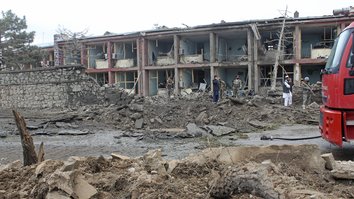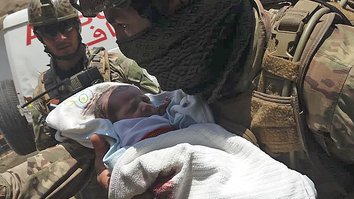KABUL -- A rash of bloody attacks targeting infants, nurses and mourners, and newly issued threats by the Taliban, raise fresh questions about the fate of a hoped-for peace process.
President Ashraf Ghani has ordered the country's security forces to resume offensive operations against the Taliban and other insurgent groups following two separate terrorist acts that took dozens of lives Tuesday (May 12).
At least 24 people were killed and another 16 wounded in an attack on a maternity hospital in Kabul, Afghan Deputy Health Minister Waheed Majroh said Wednesday (May 13).
The authorities had earlier said 14 people died in the early morning attack on Barchi National Hospital, including newborns, mothers and nurses.
![Men carry a slain woman's body following a terrorist attack in a maternity hospital in Kabul on May 12. [STR / AFP]](/cnmi_st/images/2020/05/13/24040-000_1rf6bb-585_329.jpg)
Men carry a slain woman's body following a terrorist attack in a maternity hospital in Kabul on May 12. [STR / AFP]
![Injured men are transported to a hospital following a suicide attack on the funeral of a local police commander in Nangarhar on May 12. [NOORULLAH SHIRZADA / AFP]](/cnmi_st/images/2020/05/13/24041-000_1rf10x-585_329.jpg)
Injured men are transported to a hospital following a suicide attack on the funeral of a local police commander in Nangarhar on May 12. [NOORULLAH SHIRZADA / AFP]
About an hour later, a suicide bomber killed at least 24 people and wounded 68 more at the funeral of a local police commander in Nangarhar Province, according to provincial spokesman Ataullah Khogyani.
No group immediately claimed responsibility for the hospital bloodshed, but the "Islamic State of Iraq and Syria" (ISIS) said it carried out the attack on the funeral, calling the victims "non-believers".
Ghani blamed both the Taliban and ISIS for the carnage.
"Today, we witnessed terrorist attacks by the Taliban and Daesh groups on a hospital in Kabul and a funeral in Nangarhar, as well as other attacks in the country," he said in a televised address, using the Arabic name for ISIS.
"I order all the security forces to end their active defence position, return to offensive postures and resume their operations against the enemy," Ghani said.
A resumption of operations was necessary to "defend the country, safeguard our countrymen and infrastructure, and to repel attacks and threats by the Taliban and all other terrorist groups", said Ghani.
The Taliban, which denied involvement in the May 12 attacks, said it was "fully prepared" to counter any strikes by Afghan forces.
The aggressive posturing comes months after Afghan forces pledged to only react defensively to Taliban attacks to show good faith ahead of eventual peace talks.
But the Taliban did not reciprocate, instead unleashing a wave of violence that began immediately after the insurgents signed a deal with US negotiators on February 29.
Indiscriminate killing
The first attack May 12 saw gunmen storm Barchi National Hospital as parents brought infants and children for appointments.
Afghan National Defence and Security Forces (ANDSF) eventually killed the three attackers in a lengthy clearance operation. Heavily armed security forces were seen carrying infants -- at least one wrapped in a blood-soaked blanket.
One of the wounded, Jamila, said she had taken her grandchild to the hospital for some vaccinations.
"We were outside the hospital. I wanted to go inside when they shot me and one of my grandchildren was killed," said Jamila, who only gave one name.
The hospital is in a neighbourhood that is home to Kabul's minority Shia Hazara community -- a frequent target for ISIS militants.
It is supported by the humanitarian organisation Doctors Without Borders (MSF), and a number of foreigners were working there.
"It beggars belief that such a heinous act could be committed when Afghanistan is being ravaged by the COVID-19 pandemic," UN Humanitarian Co-ordinator Toby Lanzer said.
In Nangarhar, Zabit Amir said he was preparing to stand in line for the funeral service, which locals said was attended by thousands, "when I heard a big blast and then saw hundreds of people on the ground".
"I did not even know who was alive or dead there."
The violence comes just a day after ISIS claimed responsibility for detonating four roadside bombs in northern Kabul, wounding four civilians including a child.
Fate of peace process uncertain
The latest bloodshed raises fresh questions about the fate of a hoped-for peace process that is teetering as Afghanistan grapples with the coronavirus crisis.
US Secretary of State Mike Pompeo called the attacks "appalling" and noted the Taliban's denial of responsibility.
"The Taliban and the Afghan government should co-operate to bring the perpetrators to justice," he said in a statement.
"Consistent with the agreement, the US military will continue to conduct defensive strikes against the Taliban when they attack" Afghan partners, said Pentagon spokesman Lt. Col. Thomas Campbell.
"There are few words that can do justice to the horrors we have witnessed today in Afghanistan," EU foreign policy chief Josep Borrell said in a statement.
"To target and kill mothers, newly born babies and nurses, as well as bereaved and mourning families, are acts of evil and show an appalling degree of inhumanity."
Borrell demanded the perpetrators be brought to justice and renewed a call for a permanent ceasefire in Afghanistan.
US Special Representative for Afghanistan Reconciliation Zalmay Khalilzad further pushed the two sides to work towards peace.
"Failure to do so leaves Afghanistan vulnerable to terrorism, perpetual instability and economic hardship," he said on Twitter. "Now is the time to move towards peace."








Recent explosions and terrorist attacks in the country are not the work of Taliban, but the work of ISIS. ISIS wants the talks between the Afghan government and Taliban not give result, because if Taliban make peace with the Afghan government and join the government, they will drive ISIS out of Afghanistan within a week. Taliban are the tenacious enemy of ISIS, and ISIS has not had a good day in this country because of Taliban. If Taliban were not in Afghanistan, the government would not have been able to destroy ISIS that easily. If Taliban had not fought against ISIS in remote areas, ISIS would now be a serious danger not only for Afghanistan but to the entire region, especially for neighboring countries; therefore, ISIS is trying to commit crimes in the name of Taliban so that the government does not make peace with Taliban and the war continues in this country.
Reply3 Comment
Even if they give it twenty names, Afghans know who their real enemy is. The actual enemy of Afghans is Pakistan's intelligence agencies and the terrorist army who have been killing Afghans for the last 44 years. The [former] Jihadi groups, Taliban, ISIS... are various stages of the same project of Afghanistan's destruction that Pakistan implements in Afghanistan.
Reply3 Comment
They are able to eliminate the AGEs if allowed and properly commanded.
Reply3 Comment